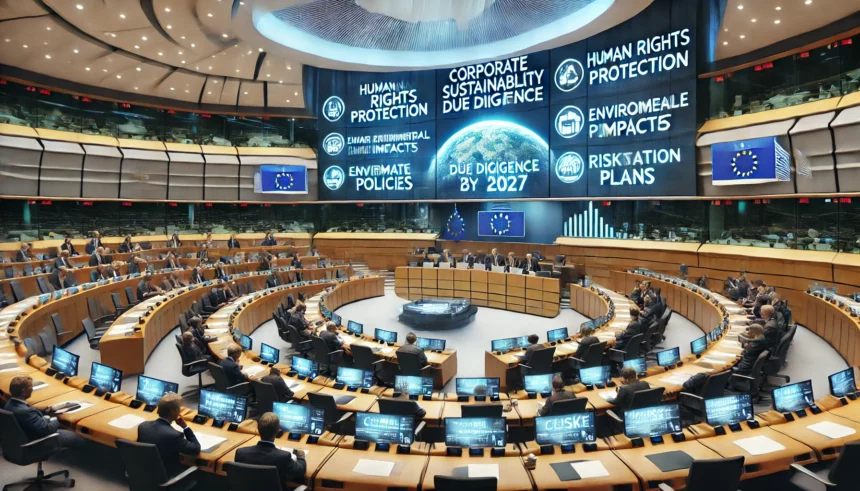The EU’s Corporate Sustainability Due Diligence Directive has officially been signed and published, setting a firm deadline for compliance. By 2027, larger companies operating in the EU will need to have robust systems in place to address and mitigate human rights and environmental impacts across their supply chains. This directive also mandates the creation of climate transition plans aligned with the Paris Agreement. Here’s a deep dive into what this means and 13 key takeaways for U.S.-based multinationals.
Background
The Directive, several years in the making, faced various delays and political opposition before finally being approved. It was published in the Official Journal of the European Union on July 5, 2024. Member States must transpose it into national law by July 26, 2026, with compliance starting from 2027.
Who’s Covered?
EU Companies:
- Over 1,000 employees and €450 million in turnover.
- Smaller subsidiaries if their parent companies meet these thresholds.
Non-EU Companies:
- Over €450 million in EU turnover.
Franchising and Licensing Models:
- Specific size and revenue thresholds apply.
Key Requirements
- Human Rights and Environmental Impacts:
- Companies must identify and address potential adverse impacts in their operations and supply chains.
- Focus areas include privacy, working conditions, child labor, environmental degradation, and biodiversity.
- Due Diligence Policies:
- Must include risk assessment, prevention, and mitigation measures.
- Requires documentation and regular updates.
- Climate Transition Plans:
- Align business models with the Paris Agreement.
- Include targets and strategies for emission reductions.
Compliance Phases
- Three Years (by July 26, 2027):
- Largest companies (over 5,000 employees and €1.5 billion in turnover).
- Four Years (by July 26, 2028):
- Companies with over 3,000 employees and €900 million in turnover.
- Five Years (by July 26, 2029):
- All other companies meeting the thresholds.
Due Diligence Steps
- Policy Integration:
- Embed due diligence into company policies and risk management systems.
- Identifying Adverse Impacts:
- Map operations and supply chains to identify high-risk areas.
- Preventing and Mitigating Risks:
- Develop action plans and seek contractual assurances from partners.
- Consider financial or non-financial investments and business plan adjustments.
- Addressing Actual Impacts:
- Take steps to end or minimize adverse impacts.
- Provide remediation when responsible.
- Stakeholder Engagement:
- Engage with stakeholders to gather information and develop action plans.
- Grievance Mechanisms:
- Implement fair and transparent complaint procedures.
- Monitoring and Reporting:
- Conduct regular assessments and publish annual reports.
13 Key Takeaways for U.S.-Based Multinationals
- Start Early:
- Begin compliance preparations now to meet the 2027 deadline.
- Reassess Scope:
- Re-evaluate if your company meets the new thresholds.
- Develop a Compliance Plan:
- Conduct a gap assessment and create a detailed compliance roadmap.
- Integrate Teams:
- Ensure collaboration between human rights and environmental teams.
- Climate Transition Focus:
- Don’t overlook the requirement for a climate transition plan.
- Watch for National Variations:
- Be aware of potential stricter national laws.
- Maintain Existing Compliance:
- Continue to comply with existing human rights and environmental laws in the EU.
- Expect Detailed Guidelines:
- Look out for upcoming EU guidelines to help with compliance.
- Leverage Industry Initiatives:
- Participate in industry and multi-stakeholder initiatives for support.
- Monitor Global Trends:
- Stay updated on similar laws in other jurisdictions like Canada and the UK.
- Harmonize Compliance:
- Integrate Directive compliance with other due diligence and reporting requirements.
- Prepare for Increased Disclosure:
- Consider how other mandatory and voluntary disclosures will affect compliance.
- Anticipate the Multiplier Effect:
- Even if not directly covered, expect pressure from partners to comply.
Conclusion
The EU’s Corporate Sustainability Due Diligence Directive marks a significant shift towards greater corporate accountability for human rights and environmental impacts. U.S.-based multinationals must take proactive steps to ensure compliance, leveraging existing initiatives and preparing for comprehensive due diligence and reporting processes. By starting early and integrating efforts across teams, companies can navigate this complex landscape effectively.
















